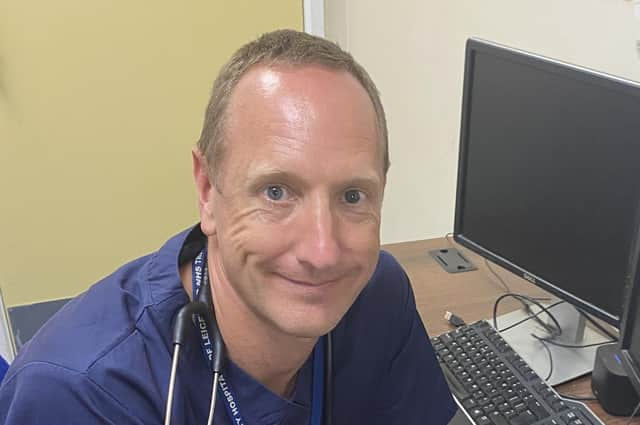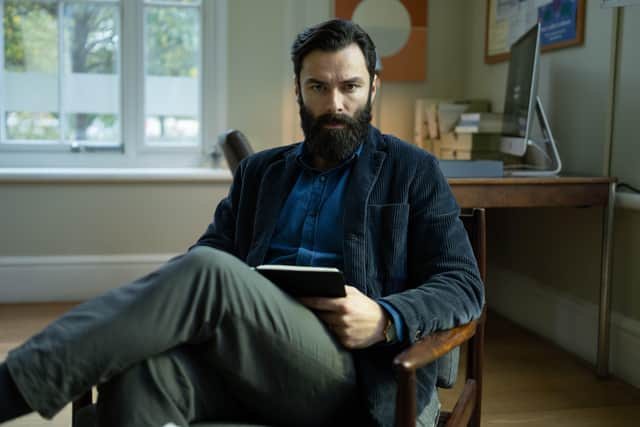NI doctor on being diagnosed with Parkinson’s at just 41


In The Suspect, currently on UTV, actor Aidan Turner portrays Dr Joe O’Loughlin, a clinical psychologist (and potential suspect in a murder case) who has just been diagnosed with young onset Parkinson’s.
Sometimes also referred to as early onset Parkinson’s, young onset Parkinson’s is the name given to the condition when diagnosed in people under the age of 50.
Advertisement
Hide AdAdvertisement
Hide AdAnother doctor diagnosed with young onset Parkinson’s – only this time in real life – is Jonny Acheson, a Queen’s University of Belfast graduate, who has worked as an Emergency Medicine Consultant in Leicester since 2009.


Originally from Banbridge, Jonny discovered he had Parkinson’s in 2016, when he was 41.
“I noticed that I had started scuffing my foot while walking and I had noticed a slight tremor in my index finger while typing, and I was constantly – abnormally – tired. But I just didn’t process it at the time,” he recalls.
“One night my friend Jules and his young daughter came round. She’d been to a Bollywood dance class, so we all decided it would be fun to have a go together. But I couldn’t ‘twist’ my wrist properly, as you’re meant to do. I knew I couldn’t ignore it any longer.”
Advertisement
Hide AdAdvertisement
Hide AdJonny and his wife decided he needed to see a doctor himself, and his GP quickly referred him to a neurologist. It was then that they were given the diagnosis.
“Three words,” Jonny says, ‘Idiopathic Parkinson’s Disease’. I just couldn’t get my head round it.”
Reacting in the same methodical way as he was used to doing at work, Jonny decided to tell his two children first, then researched and learned as much as he could about Parkinson’s through watching YouTube videos and reading online articles. These prompted him to join a gym and start a tailored physical activity programme to help with his symptoms which he has
continued since, adapting the regime during Covid.
He tries to keep stress to a minimum as that is the biggest depleter of his dopamine and he realises the impact his non motor or invisible symptoms have are probably greater than his motor symptoms.
Advertisement
Hide AdAdvertisement
Hide AdHe describes Parkinson’s as a mind disorder as much as it is a movement disorder.
Jonny then told other close members of his family, and shared what he had learnt with them.
“Everyone was shocked and had questions. But information alleviates the fear of the unknown,” he says.
Fast forward six years. In June 2022 Jonny was appointed director of Engagement and Communications at the Parkinson’s Excellence Network, which helps health and social care professionals to provide better support for people with the condition.
Advertisement
Hide AdAdvertisement
Hide AdHe says: “I’m in a unique position whereby I can see the challenges and potential solutions from both the perspective of a medical professional and someone living with the condition.
“Sometimes the things that will have the most impact, like educating the NHS workforce on the importance of people with Parkinson’s getting their time-critical medications every time, are very simple but the challenge is in communicating clearly why practice needs to change.”
In preparation for his acting role, Aidan Turner spent time consulting with Drew Hallam, a musician diagnosed with early onset Parkinson’s about five years ago, when he was 35.
“We met a few times to talk about how he deals with the condition and copes with it,” Aidan recalls. “We also spoke about how it was for him in the early stages.
Advertisement
Hide AdAdvertisement
Hide Ad“Something struck me in one of the early conversations we had when he said how difficult it was when you’re young with this condition. He said there are support groups, but Parkinson’s doesn’t generally affect younger people. Drew went to one of these support groups early on and he was the youngest person there.
“We talked about the side effects of the medication, how he deals with the physical side of things. When it’s better, when it’s worse, under stress or duress. Every day is a different challenge, he said. With some better than others. To speak with somebody so open and truthful about his experience was very beneficial. I’m grateful to Drew for that.”
Annette Hand, Professor of Nursing at Newcastle Upon Tyne Hospitals NHS Foundation Trust and Clinical Lead for Nursing at the Parkinson’s Excellence Network, also advised the programme makers.
She said: “Parkinson’s is a complex neurological condition with more than 40 symptoms, so The Suspect won’t be representative of everyone’s experience of Parkinson’s, but my hope is that it will help raise awareness of the condition.
Advertisement
Hide AdAdvertisement
Hide Ad“Many think Parkinson’s only affects older people, so it’s great to see a character in a primetime drama with young onset Parkinson's. Whilst The Suspect is based on a work of fiction, it will spark many important conversations.
“If you are concerned that you may have Parkinson's, it is important to see your GP. You can also find help and advice by visiting the Parkinson's UK website www.parkinsons.org.uk or by calling their free, confidential helpline on 0808 800 0303.The Suspect continues on UTV on Monday at 9pm. Previous episodes can be watched on catch up on the ITV Hub at itv.com.
Comment Guidelines
National World encourages reader discussion on our stories. User feedback, insights and back-and-forth exchanges add a rich layer of context to reporting. Please review our Community Guidelines before commenting.